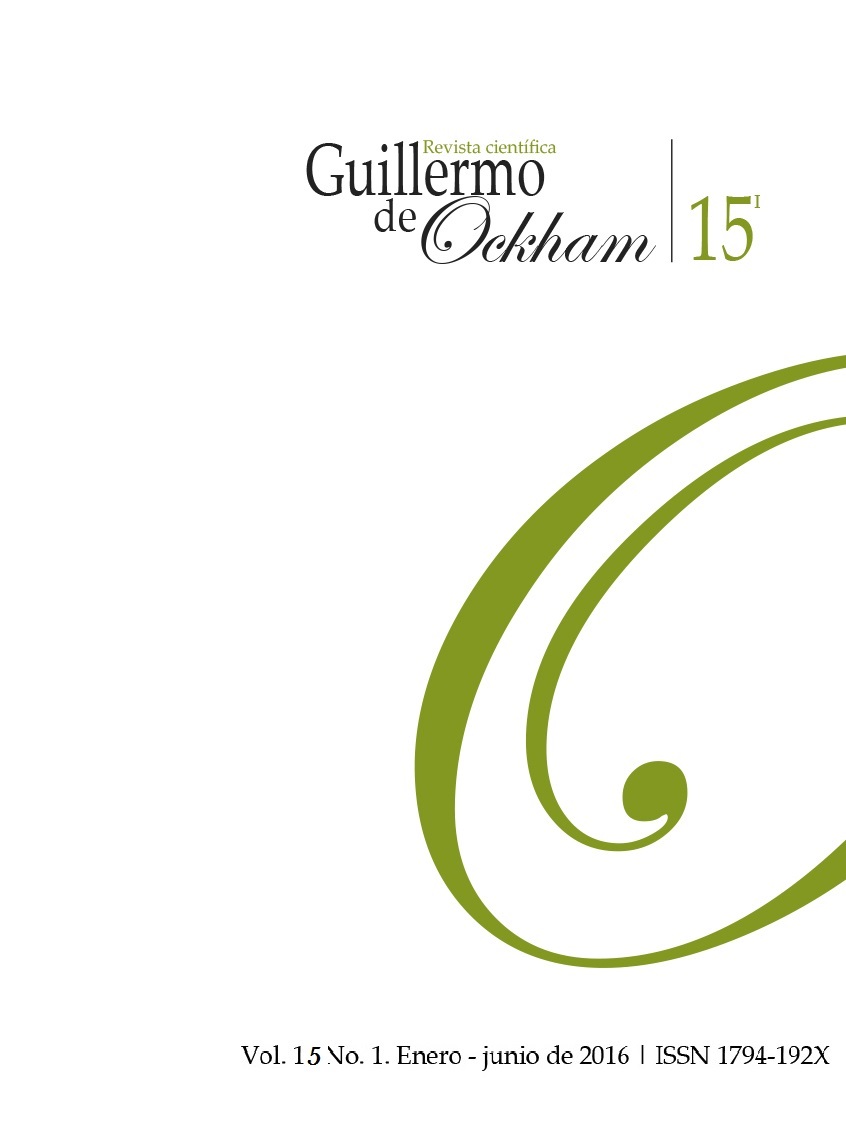The Revista Guillermo de Ockham provides an immediate and open access to its content, based on the principle of offering the public a free access to investigations to provide a global interchange of knowledge.
Unless otherwise established, the contents of this journal has a license with Creative Commons Attribution-NonCommercial-NoDerivatives 4.0 International (CC BY-NC-ND 4.0) http://creativecommons.org/licenses/by-nc-nd/4.0/
- Attribution: You must give appropriate credit, provide a link to the license, and indicate if changes were made. You may do so in any reasonable manner, but not in any way that suggests the licensor endorses you or your use.
- NonCommercial: You may not use the material for commercial purposes.
- NoDerivatives: If you remix, transform, or build upon the material, you may not distribute the modified material.
- No additional restrictions: You may not apply legal terms or technological measures that legally restrict others from doing anything the license permits.
Resumo
Referências
Barrios, R. (2001). Motivación hacia la práctica del ejercicio en corredores cubanos. EFDeportes.com, Revista Digital, http://www.efdeportes.com. Buenos Aires Año 6 - Nº 31. Feb/2001.
Barrios, R. y Cardozo, L. (2002). Motivación para competir en corredores populares cubanos. Disponible en http://www.efdeportes.com/efd47/motiv.htm (visitado el 15 octubre del 2012).
Buceta, J.M. (1998). Psicología del Entrenamiento Deportivo. Madrid: Dykinson.
Buceta, J.M (1999). Psicología del Alto Rendimiento Deportivo. Madrid: Real Federación Española de Fútbol.
Buceta, J. M., López de la Llave, A., Pérez-Llantada, M. C., Vallejo, M. y Del Pino, M. D. (2002). Intervención psicológica con corredores de maratón: características y valoración del programa aplicado en el maratón de Madrid. Revista de Psicología del Deporte, 11 (1), 83-109.
Burton, D. (1988). Do anxious swimmers swim slower? reexamining the elusive anxietyperformance relationship. Journal of Sport and Exercise Psychology, 10, 45-61.
Buceta, J. M., López de la Llave, A., Perez-Llantada, M. C., Vallejo, M., y Del Pino, M. D. (2003). Estado psicológico de los corredores populares de maratón en los días anteriores a la prueba. Psicothema, 15(2), 273-277.
Burton, D. (1988). Do anxious swimmers sxin slower? reexamining the elusive anxiety-performance relationship. Journal of Sport and Exercise Psychology, 10, 45-61.
Cauas, R. (2010). Evaluación de la ansiedad precompetitiva en corredores de maratón y media maratón que participaron en el Maratón Internacional de Santiago, mediante la aplicación del CSAI-2, D.E.A., Universidad Mayor, Chile.
Rev. Guillermo de Ockham 15(1), 2017 Articulo IN PRESS
Gould, D., Petlichkoff, L., Simon, J. y Vevera, M. (1987). The relationship between Competitive State Anxiety Inventory-2 subscale scores and pistol shooting performance. Journal of S port Psychology, 9, 3 3 - 4 2.
Martens, R., Vealey, R.S. y Burton, D. (Eds.) (1990). Competitive Anxiety in Sport. Champaign, Ill: Human Kinetics.
McMillan, J. y Schumacher, S. (2005). Investigación Educativa. Madrid: Pearson.
Nideffer, R.M. (1985). Athletes’ Guide to Mental Training. Champaign, Ill: Human Kinetics.
Ogles, B.M. y Masters, K.S. (2000). Older vs younger adult male marathon runners: participative motives and training habits. Journal of Sport Behavior, 23(2), 130-143
Orlick, T. (1986). Psyching for Sport: Mental Training for Athletes. Champaign, Ill: Leisure Press. Silva, J.M. y Appelbaum, M.I. (1989). Association- Dissociation patterns of United States olympic marathon trial contestants. Cognitive Therapy and Research, 13(2), 185-192.
Thomas, J.R. y Nelson, J.K. (2007). Métodos de investigación en actividad física. Barcelona: Paidotribo.
Thornton, E., Cronholm, P., Mccray, l. y Webner, D. (2008). Does Marathon Training Adversely affect Baseline Anxiety Levels?”, AMAA Journal, 21(3), 5.
Verma, G. y Mallick, K. (1999). Researching Education. Perspectives and Techniques. London: Falmer Press.































